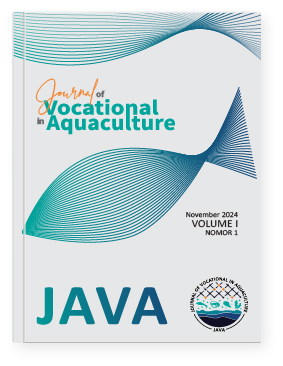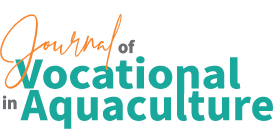Aim and Scope
Aims and scope
The Journal of Vocational in Aquaculture (JAVA) is a platform for sharing practical information that is essential for researchers to meet the needs of stakeholders e.g. industry, farm managers, governments to adapt aquaculture theory to achieve sustainable production and economic objectives throughout the world.
To make it more accessible to farmers and non-specialists in addition to professional aquaculture researchers, authors publishing in the Journal of Vocational in Aquaculture (JAVA) are requested to avoid basic research that has only downstream or marginal applicability to actual farming systems. Technical jargon should be kept to a minimum. Tables and figures that facilitate comprehension are encouraged. An economic and feasibility analysis should accompany any proposed technological innovation. Both original research and reviews will be considered.
Manuscripts can be of varying length, depending upon the subject matter. The presentation of each manuscript must comply with the instructions for authors of the Journal of Vocational in Aquaculture (JAVA).
Suitable topics include, but are by no means limited to:
- System and technology to achieved efficient and sustainable production
- Practical diet formulation, feed conversion efficiencies
- Environmentally friendly production.
- Fish health management.
- Techniques and management of broodstock quality.
- Case studies from development projects, small and large-scale;
- On-farm trials;
- Review of aquaculture policy, successes and failures.
Article types
Research Papers should report the results of original research. The material should not have been previously published elsewhere. Articles are expected to contribute new information (e.g. novel methods of analysis with added new insights and impacts) to the knowledge base in the field, not just to confirm previously published work.
Review Articles can cover either narrow disciplinary subjects or broad issues requiring interdisciplinary discussion. They should provide objective critical evaluation of a defined subject. Reviews should not consist solely of a summary of published data. Evaluation of the quality of existing data, the status of knowledge, and the research required to advance knowledge of the subject are essential.
Short Communications are used to communicate results which represent a major breakthrough or startling new discovery and which should therefore be published quickly. They should not be used for preliminary results. Papers must contain sufficient data to establish that the research has achieved reliable and significant results.
General Information
- Manuscripts must be original, have not been published previously in any scientific journal, that manuscripts are not being submitted for publication elsewhere, and will not be submitted to any media during the review process, unless the authors have officially withdrawn the manuscripts from Tropical Animal Science Journal. Tropical Animal Science Journal uses a similarity check program to prevent any suspected plagiarism in the manuscripts.
- Each author with an initial (e.g. D.E.R for Dian Eka Ramadhani) should indicate his/her specific contribution to the manuscript. There are several categories, i.e concept and design of the study, acquisition of data, analysis of data, interpretation of data, drafting the manuscript, critical review/revision, and others. The statement must be declared in the author statement form.
- JAVA accepts equal contribution for the first author. JAVA also allows multiple corresponding authorship for one article. Only one author should correspond with the editorial office for one article.
- Author Statement Form is an author statement form containing several conditions that the authors must comply with, who will submit their manuscript to JAVA. Those conditions are Author Responsibility, Publication Fee, Author Contributions, Disclosure of Conflicts of Interest, Institutional Animal Care and Use Committee (IACUC) Approval, and Copyright Transfer Agreement.
- Manuscripts submitted are research topics that have no conflict with bioethical research.
- Manuscripts encompass a broad range of research topics in tropical animal sciences: breeding and genetics, reproduction and physiology, nutrition, feed sciences, agrostology, animal products, biotechnology, behaviour, welfare, health and veterinary, livestock farming system, integrated farming system, socio-economic, and policy.
- Starting from the year 2024, the journal is published TWO times a year, i.e. May and November.
- The manuscripts, Author Statement Form, and IACUC approval lettershould be submitted electronically through an online system: https://journal.ipb.ac.id/index.php/java/index








